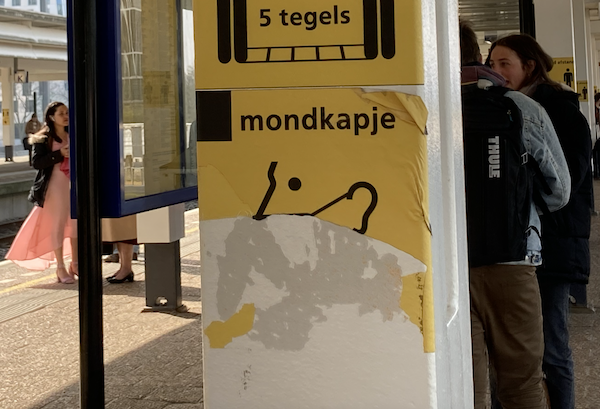Covid five years on: three kisses are out, IC shortage remains

Five years on from the first case of coronavirus in the Netherlands, some of the habits people picked up over the three years of the pandemic have become ingrained in daily life.
According to a survey among members of the RTL Nieuws panel, some 68% of respondents still sneeze into their elbow to prevent infecting others, while 64% washed their hands more regularly.
Over half (63%) still kept their distance in case of an infectious disease and 46% abandoned the traditional three kisses and handshakes for good. Around 30% said they still avoided crowds and say no to party invites.
The Dutch are also walking more since the pandemic, with the distance travelled by foot every day up by some 33%, according to figures from mobility institute KIM late last year.
The first official coronavirus victim in the Netherlands was a 57-year-old man who had been on a winter sports holiday in the Italian region of Lombardy where some hundreds people were diagnosed with coronavirus at the time.
Health officials who traced his movements on his return found he had been celebrating Carnaval in Brabant, which later turned into one of the coronavirus hot spots.
Around 50,000 people are thought to have died from the virus in the Netherlands while some 450,000 are still limited in their daily activities because of Long Covid. Around 100,000 people are almost entirely incapacitated, experts say.
While responsible citizens are holding on to coronavirus habits, things are not the same at a national level, the Parool reported on Thursday.
The Netherlands is even less prepared for the next pandemic than before, with fewer intensive care places and no plan in place to scale up that number if needed, experts have warned.
Before the coronavirus pandemic, the Netherlands had 1,150 IC beds, which were increased to a maximum of 1,600. The lack of beds, which determined to a large extent the necessity for stringent measures, was the weakest link in the battle against the virus, experts said.
A “programme pandemic preparedness” drawn up by the then health minister Ernst Kuipers included a permanent number of 1,700 IC beds but the total is currently 850 and falling. The programme itself has been hit by cutbacks of €300 million.
Unprepared
A report by the safety research council Onderzoeksraad voor Veiligheid confirmed the lack of preparedness for another pandemic saying regional health boards would “not be able to realise the necessary expansion, computer models or upscale the number of IC beds because of the cutbacks.”
An additional problem has now surfaced with the election of Donald Trump as president of the United States, where there is a serious outbreak of bird flu. Trump has recently fired CDC public health workers, including those who involved in combating pandemics.
Microbiologist Marc Bonten cited the geopolitical situation as a risk for a devastating outbreak of bird flu among people, as well as the United States’ withdrawal from the World Health Organisation (WHO).
“This virus is increasingly infecting people and there is no proper vaccine. The United States is looking away and not monitoring the situation. The problem could surface when it is too big to manage.”
Thank you for donating to DutchNews.nl.
We could not provide the Dutch News service, and keep it free of charge, without the generous support of our readers. Your donations allow us to report on issues you tell us matter, and provide you with a summary of the most important Dutch news each day.
Make a donation